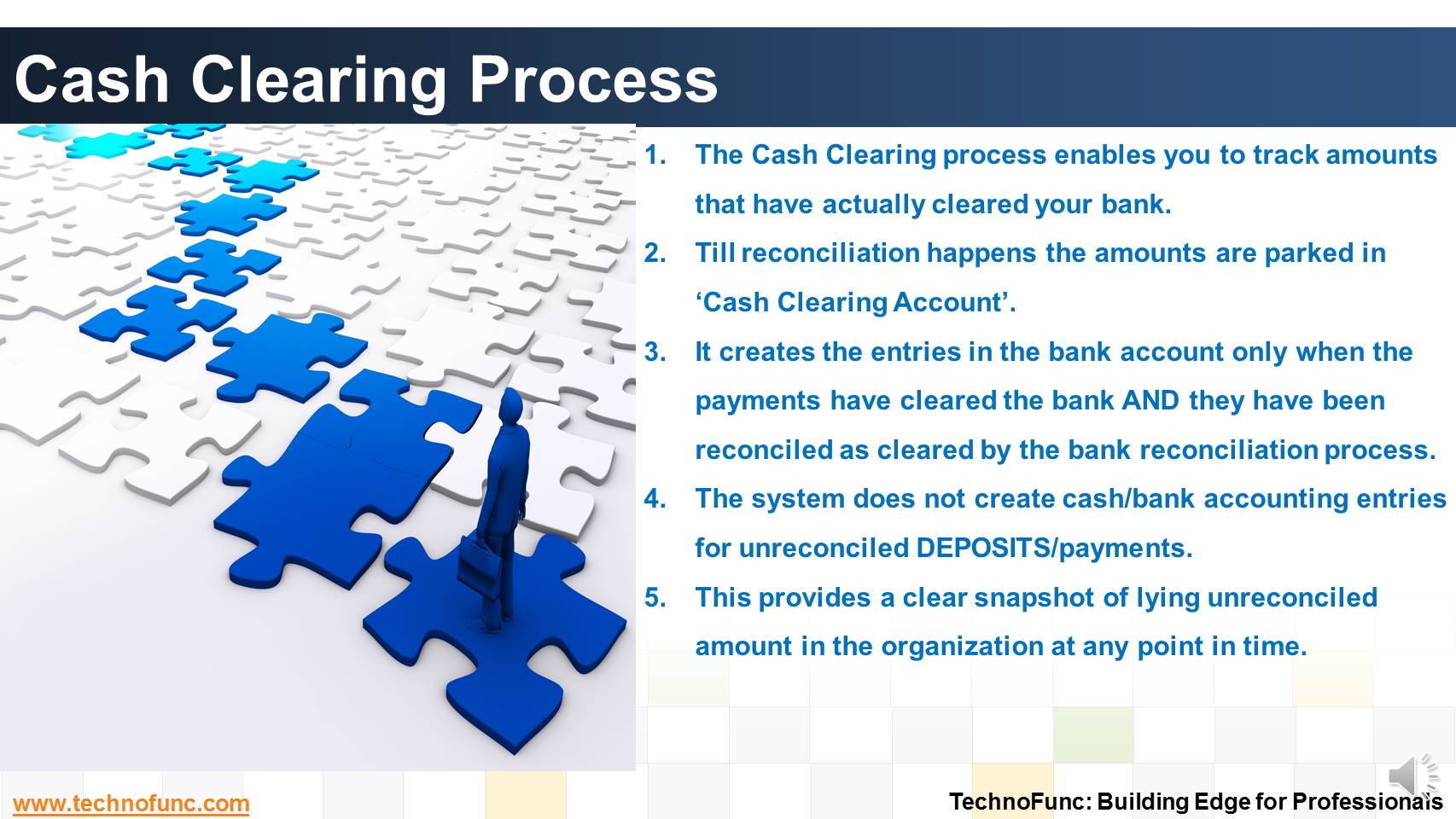- Home
- Business Processes
- Industry Knowledge
- Aerospace Industry
- Automotive Industry
- Banking Domain
- BFSI Industry
- Consumer/ FMCG Industry
- Chemicals Industry
- Engineering & Construction
- Energy Industry
- Education Domain
- Finance Domain
- Hospitality Domain
- Healthcare Industry
- Insurance Domain
- Retail Industry
- Travel and Tourism Domain
- Telecom Industry
- Leadership Skills
- eLearning
- Home
- Business Processes
- Cash Management
- Cash Clearing Process
Cash Clearing Process
The Cash Clearing process enables you to track amounts that have actually cleared your bank. Till reconciliation happens the amounts are parked in 'Cash Clearing Account'.
Cash Clearing Process
Rather than hitting the bank accounts, in cash clearing systems, the cash/bank transactions are parked in 'Cash Clearing Account'.
Once reconciliation with bank statement is done the reconciled amount is transferred to Cash/Bank Account.
This provides a clear snapshot of lying unreconciled amount in the organization at any point in time.
The Cash/Bank account reflects only the balance that has been reconciled with the transactions of Bank.
The Cash Clearing process enables you to track amounts that have actually cleared your bank versus amounts still floating in the banking system.
The Cash Clearing process creates accounting entries to record the actual settlement in your cash/bank account in general ledger only when you clear the payment transactions in the system during the reconciliation process.
Till reconciliation happens the amounts are parked in 'Cash Clearing Account'.
It creates the entries in the bank account only when the payments have cleared the bank AND they have been reconciled as cleared by the bank reconciliation process.
The system does not create cash/bank accounting entries for unreconciled DEPOSITS/payments.
This provides a clear snapshot of lying unreconciled amount in the organization at any point in time.

Related Links
You May Also Like
-
Treasury Management - Benefits
Effectively using treasury management with cash management and trade finance products brings tangible benefits to both corporates and financial institutions. Let us discuss some tangible benefits of treasury function.
-
Disbursement Float is the time taken from payment creation to settlement. Collection float is the sum total of time taken by Payment Float; Mail Float; Processing Float and Availability Float. Learn more!
-
The terms Treasury Management and Cash Management are sometimes used interchangeably, while, in fact, the scope of treasury management is larger and includes funding and investment activities as well. Learn all about Treasury Management here!
-
Introduction to Cash Clearing Process
Unravel the mystery behind clearing accounts. Learn why clearing accounts are used in finance and accounting. Learn why so many clearing accounts are defined in ERPs and Automated Accounting Systems.
-
Have you ever wondered what is actually a Bank Statement and why it is needed. What is the information that is available in a bank statement?
-
Why enterprises need cash management. What is the purpose of having a well defined cash management process?
-
Before we dive into cash management, let us fist understand what we mean by cash and what constitutes cash in context of cash management process.
-
Learning objectives for this lesson are: Meaning of Order to Cash Process; Sub Processes under Order to Cash; Process Flow for Order to Cash; Key Roles & Transactions; Key Setups/Master Data Requirements.
-
The topic for this lesson is "Introduction to Cash Management Process". We start with the learning objectives for building requisite functional expertise in cash management process.
Explore Our Free Training Articles or
Sign Up to Start With Our eLearning Courses

About Us
Learning
© 2023 TechnoFunc, All Rights Reserved









